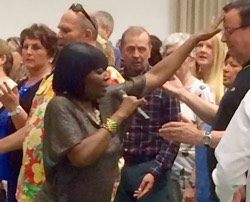Reconciliation Issues in the Inner Man
Many of the issues that come into play with racism and with reconciliation are reflected in the conflicts, dynamics, and healing within the soul of a person. In fact, there needs to be reconciliation within each of us—first to God, then with the conflicted, divided aspects of our souls as they are being sanctified. Understanding these dynamics can greatly help heal conflicts between individuals. Here are some key points to consider–
1. We are divided within, but God promised us a whole heart. James talks about double-mindedness. We walk with a foot in the Kingdom and a foot in the world. God desires us to worship Him with a whole heart and promises to give us one. We have been bought with a price; we are not our own.
2. What have we submitted to as believers? Do we realize that we are citizens of a new Kingdom with a new set of principles and ways, with a new kind of leadership. Is our loyalty to anything other than our King and His Kingdom. Do we see Him as sovereign—as Lord—in all the affairs of our lives? Who are we really blaming when bad things come to us? (Ps. 75:7, 105:17)
3. Is our thinking clearly Kingdom thinking? Or are we infected by lies from the culture we live in, from lies that came in because we were wounded, or from the sins and wounds of generations before us? From our worldly educational system? (In His Kingdom, we also get a new culture, a new (rather, no) race, new DNA. There is neither Jew nor Greek…) How infused are we by “cultural bias”?
4. Where do we get our sense of value (some call it “legitimacy”)? Does it come from what others say about us and call us, from what we achieve, from our titles, from our race? Or does it come from what our King says about us? How do we see ourselves as believers? Do we know we “new creations,” cleansed from our sins, seated with Christ in the heavenlies?
Is the root of any kind of racism really an effort to make us feel better than another to increase our own self-esteem?
5. How, then, do we see others? Do we realize each person before us has great value, no matter how handicapped, no matter what race or station in life, how broken with addictions and crime?
6. Are there weights that entangle us from running the race? Bitterness, greed, low sense of value, unconfessed sin, inner vows, strongholds in our thinking, unyielded areas of our lives, greed, unhealed woundedness—these are only a few weights that can hinder our effectiveness for the Kingdom.
7. Are we carrying unhealed pain? Even though someone who hurt us, asks for our forgiveness and tries to make amends,only God can really heal our hurts. (“By sorrow of heart the spirit is crushed” – Proverbs 15:18) And He does! He can remove trauma, lift sorrow, put together brokenness, and fill the big void left by imperfect or absent parenting. We get to experience more of His love and grace, and then it can flow to others.
8. Unhealed painful memories from the past and the lies infecting us from those can cause “triggers” that can cause us to flare up when anything vaguely familiar happens in the present. They are like distorted lenses that cause us to see new people as if they are the ones in the past who hurt us.
We can learn to recognize when we are triggered , and then go to the Father to ask what lie from the enemy we have been believing that caused that reaction, and to receive His healing.
9. Anger is a defense, a self-made guardian to protect us from feeling very vulnerable or frightened. God will take away the anger and become the security we really need.
10. Anything we have put our trust in other than God Himself becomes an idol that will cause spiritual blindness (Isaiah 28.) He is our Source for all things—security, comfort, provision, esteem, etc. Failing to acknowledge that and to thank Him sets us on a downward spiral (Rom. 1: 21).
11. When we recognize God’s sovereignty over our lives, we can thank Him for the hard things that come. He can show us the bigger picture and let us see the purpose for our suffering.
(Joseph, Esther, Paul, Daniel)
12. Our goal is to let God show us His design for us, as meant to be used in God’s Kingdom. It’s not about us! We must each find our birthright and walk in it.
13. There is power in honor. When we honor another, he is empowered to become what he was designed to be. In reverse, dishonor saps strength from a person and blocks him from finding and using his gifts. How can we do that to someone made in the image of God?


